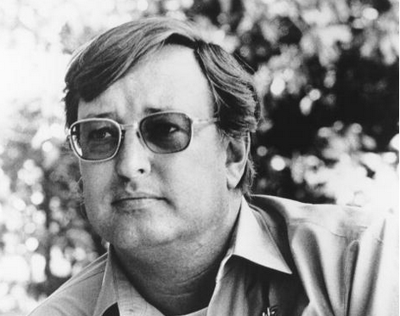Embed from Getty ImagesListening to songwriter John D. Loudermilk talk in 2007 about the sources of his inspiration, I entered the world of a down-home mystic with an interest in spectral communication that translated, once he took hold of it, into songs that were pithy, kaleidoscopic and very American. Loudermilk, who died Wednesday at his home in Christiana, Tenn., at 82, told Country Music Hall of Fame interviewer Michael Gray how he willed his 1957 song “Sittin’ in the Balcony” into becoming a hit. He did it, he said, by visualizing a disc jockey putting the needle down on his song after it had become the best-selling record in the country.
As for where the inspiration came from in the first place, Loudermilk had an answer: “The Bible says you have to have the word first,” he told Gray. “People ask me, what comes first, the words or the music? The words, man. If you got the word, you can create what the word is.”
Loudermilk got the word from his parents, who had moved in the 1920s from Alabama’s Sand Mountain area to Durham, N.C., where his father plied his trade as a carpenter and his mother did missionary work. (Fellow residents of Sand Mountain were Loudermilk’s cousins Charlie and Ira Loudermilk, who later changed their name to Louvin.) He was born in Durham on March 31, 1934, and he learned to play music in a Salvation Army band. “The first song I ever played in my life was on the stage of the Salvation Army when I was seven, with my mother, and it was ‘Life’s Pathway to Heaven,’ ” he told Gray. “Yeah, and once I saw the little girls swell up and their eyes start twinkling, I said, ‘Uh uh, there’s no more poverty for me, man.’ “
In fact, Loudermilk didn’t grow up in poverty, and what is perhaps his most famous song, “Tobacco Road,” wasn’t about the kind of experience that would scar a young artist. He wrote it in 1959, inspired by a job he had delivering telegrams on a rough Durham street named Marvin’s Alley that was home to tobacco warehouses and red-lighted houses of assignation. British Invasion producer Mickie Most cut The Nashville Teens’ metallic 1964 hit rendition of the tune, and power popper and North Carolina native Chris Stamey recorded a barbed version in 1982
Before he moved to Nashville in 1958, Loudermilk wrote his first hit, 1956‘s “A Rose and a Baby Ruth.” University of North Carolina student George Hamilton IV recorded it for Orville Campbell’s Colonial Records, a Chapel Hill label that also released Loudermilk’s own version of “Sittin’ in the Balcony,” which became a 1957 hit for Eddie Cochran, just as Loudermilk had wished. Stan Robinson’s 1959 single “N-u-t-h-i-n-g,” written with fellow Nashville tunesmith Marijohn Wilkin, explored rock ‘n roll nihilism and sported a superb Boots Randolph saxophone part.
Also written with Wilkin, 1959's “Waterloo” became a hit for country singer Stonewall Jackson, while another song Loudermilk wrote that year, “Pale Faced Indian,” didn’t make much of an impression when country-folk singer Marvin Rainwater recorded it in 1960. Loudermilk reworked it seven years later as “The Lament of the Cherokee Reservation Indian,” which in turn was recorded in 1968 by English pop singer Don Farndon. American rock group The Raiders recast Farndon’s hit version and took the song to No. l in 1971.
Loudermilk’s '60s output is remarkable for its range and reach. His 1962 “Then You Call Tell Me Goodbye” exists in great versions by pop-country singer Johnny Tillotson, country singers Eddy Arnold and Neal McCoy and soul vocalists William Bell, Solomon Burke, James Brown and Bettye Swann. Meanwhile, Loudermilk didn’t write “Abilene,” a song often associated with him. Facilitating the recording and subsequent success of George Hamilton IV’s 1963 hit version of Lester Brown, Albert Stanton and Bob Gibson’s song, he was awarded a third of the songwriting royalties in a deal made by Acuff-Rose executive Wesley Rose.
Like Marijohn Wilkin and Billy Edd Wheeler, Loudermilk helped shape the ‘60s folk-country-pop songwriting revolution in fascinating ways. For example, his 1961 song “Road Hog” became a standard in Brazil’s mid-’60s pop scene after Erasmo Carlos arranged it in 1964 for fellow Brazilian pop singer Roberto Carlos. The song symbolized the Brazilian fascination with American music that would lead to the subversive pop movement called Tropicália.
In the late '60s, Loudermilk’s “Break My Mind” became a country-rock standard that was recorded by George Hamilton IV, The Box Tops and The Flying Burrito Brothers. Loudermilk also released solo albums during the ‘60s and ‘70s, and they’re strange amalgams of satire and blissful humor.
He left Nashville for eight years in the '70s, and when he returned he began working with the city’s songwriters’ organizations. He sat on the boards of the Nashville Songwriters Association International and the Songwriters Guild of America. As he told American Songwriter’s Leigh Donaldson in 2009, “After being gone for eight years, when I came back and looked at the contracts songwriters are signing now, they were worse than they were when I left.”
Loudermilk was honored at a March show at the Franklin Theatre. Rodney Crowell, Emmylou Harris and Bobby Braddock were some of the musicians and writers who paid tribute to his genius.
Loudermilk described the American landscape in precise and sometimes antic ways, but you can feel his longing for a spiritual home in virtually every song he wrote. Music contains multitudes, as he told Gray in 2007: “Once you’ve played an instrument, and once you’re able to reach through the veil and appropriate what you need, how can you be poor? That’s the height of wealth, and I’ve been that way my whole life.”
Loudermilk is survived by his wife of 48 years, Susan. Funeral arrangements are pending.





